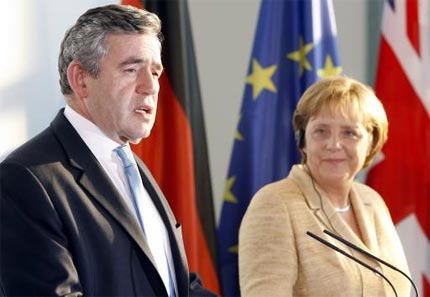
What with the ongoing spat with Russia (hyped out of all proportion, I reckon, and hope I’m not proved wrong), the fact that our dear new Prime Minister has made his first overseas jaunt while in office seems to have been largely forgotten. The fact that Brown managed a solid three weeks in the UK before nipping off abroad – approximately 400% longer than Tony Blair ever managed during his ten years in office* – has likewise received little comment. (Blair’s first overseas visit, by the way, was to the US, which could be significant…)
But why, with so much to do in Europe, Germany? Why suck up to Angela Merkel, with her relatively unstable coalition and two weeks after she passed the EU presidency on to Portugal? Why not follow the EU presidency itself? Why not head to Brussels and meet Commission head Barroso? Why not try to form a good relationship with Europe’s most secure and powerful politician, Nicholas Sarkozy (who he’s due to meet on Friday)? Why not Sarkozy and Merkel at the same time, in an EU big three spitroast?
Well, according to Der Spiegel, it’s an indication of a newly-strengthened bilateral love-in between the UK and Germany, largely revolving around Merkel herself, and primarily thanks to her stewardship of the EU treaty talks that ended up with something with which Britain (if not British eurosceptics) can be fairly happy for its (relative) lack of radical changes. Back in the UK, the Times has dubbed the Brown/Merkel love-in a “new European axis” – though one can only assume that the pun was unintentional…
But is that all? While Brown was in Berlin, one of the areas specifically mentioned was terrorism and the need for closer cooperation across the EU. Merkel was elected, in part, on a tough on terror stance, and has long been spouting hard rhetoric that – to wishy-washy liberals like me – could sound a tad concerning:
“Our open, liberal societies have proven useful retreats for terrorists. The assassins made use of the civil liberties they were offered without adopting in any way whatsoever the civil values associated with this social order… it is important to strike a new balance between liberal, civil rights on the one hand and measures that ensure the protection and security of the citizens on the other.”
That was back in 2002 – and it’s a relatively safe bet that had Merkel been Chancellor back then, Germany would have been far more actively involved in The War Against Terror, rather than ending up lumped in with France as terrorist appeasers.
Meanwhile, having had a couple of failed terrorist attacks within a couple of days of taking office, Gordon Brown must feel like he has to do something to prove that he’s going to be tough on terror. He’s always been a fan of the controversial idea of 90 days detention without trial to help combat terrorism, and is currently under fresh pressure to reintroduce the rejected legislation. It remains, however, a highly contentious issue, and there’s no guarantee that he’d be able to get it through the Commons – and a defeat this early in his premiership would be highly damaging.
And here’s where Merkel and her long-term support for radical approaches to tackling terrorism could well come in – not to mention Germany’s long post-war tradition of stifling civil liberties in the name of security through its banning of swastikas, Nazi salutes and the like to discourage fascism. (Not that the policy has worked, but since when did failure discourage the faith of the ideological?)
As has been noted here before (and at length by me elsewhere), Labour under Blair were always rather keen to use the mechanisms of the EU to avoid the necessity of votes in the British parliament on controversial issues, often revolving around clamping down on civil liberties in the name of The War Against Terror.
If Brown and Merkel team up to introduce new anti-terror measures, the combined influence of Europe’s two biggest economies could well be enough to convince the rest of the EU that their proposals are worthwhile. Because, let’s face it, one of the best ways in which the EU can prove its usefulness beyond being just a customs union is to help combat international crime, of which terrorism is the most high-profile example. It’s in the interest of any pro-integration types to back tough counter-terrorism measures, which is why there have been so many attempts to bring in EU-wide terrorism legislation in the last few years.
So, is Brown sucking up to Merkel to get the 90 days detention idea put through at an EU level? They certainly don’t seem to have had much to say about the new EU treaty, which Merkel got through a few weeks back, nor on the future of the EU in any broad sense.
Considering that Brown, during his time as Chancellor, always appeared to have seen the EU as a nuisance that’s best ignored and sidelined as much as possible, is the emphasis on the meeting being between nation states, rather than “EU partners” also significant? Will his meeting with Sarkozy reveal any new strategies? Or is it still – as I suspect, despite all this speculation – far too early to tell just what Brown’s got planned?
* May be a lie

Pingback: Erkan's field diary